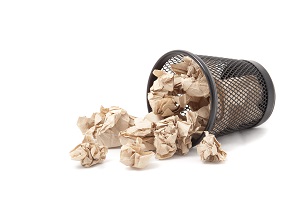In my mother tongue, there is a word for it, and it is a noun.
The action is observed when you think the paper is waste. You squeeze it, and it loses its texture/avatar. Then, it is no more straight or flat.
Here is the image. Check those papers. What have they become?
Precisely...
I wanted to put everything in words. I tried it on a paper. I did not like it. I __________ it and threw it in a dustbin.
You find nothing in this dustbin except some __________ papers

